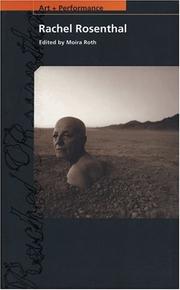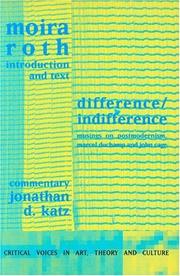| Listing 1 - 10 of 10 |
Sort by
|

ISBN: 0801856299 Year: 1997 Publisher: Baltimore (Md.) : Johns Hopkins university press,
Abstract | Keywords | Export | Availability | Bookmark
 Loading...
Loading...Choose an application
- Reference Manager
- EndNote
- RefWorks (Direct export to RefWorks)

ISSN: 10259325 ISBN: 9057013312 Year: 1998 Publisher: Amsterdam, The Netherlands : GB Arts International,
Abstract | Keywords | Export | Availability | Bookmark
 Loading...
Loading...Choose an application
- Reference Manager
- EndNote
- RefWorks (Direct export to RefWorks)
Postmodernism. --- Arts, Modern --- Avant-garde (Aesthetics) --- Cage, John --- Duchamp, Marcel, --- Criticism and interpretation. --- Avant-garde (Aesthetics).
Book
ISBN: 9780822345695 9786613065049 9780822345527 1283065045 0822391228 0822345528 0822345692 Year: 2010 Publisher: Durham, NC : Duke University Press,
Abstract | Keywords | Export | Availability | Bookmark
 Loading...
Loading...Choose an application
- Reference Manager
- EndNote
- RefWorks (Direct export to RefWorks)
A collection of thirty texts written by the internationally renowned conceptual and performance artist Suzanne Lacy between 1974 and 2007.
Political philosophy. Social philosophy --- Art --- performance artists --- performances (kunst) --- maatschappijkritiek --- cultuurkritiek --- Lacy, Suzanne --- Public art. --- Arts --- Politics in art. --- Social problems in art. --- Performance art. --- Art and society. --- Political aspects. --- Criticism and interpretation. --- Art conceptuel --- Performance --- Art et politique --- Identité de genre --- Féminisme --- Public art --- Politics in art --- Social problems in art --- Performance art --- Art and society
Digital
ISBN: 9780822345695 9786613065049 9780822345527 Year: 2010 Publisher: London Duke University Press
Abstract | Keywords | Export | Availability | Bookmark
 Loading...
Loading...Choose an application
- Reference Manager
- EndNote
- RefWorks (Direct export to RefWorks)
Since the 1970s, the performance and conceptual artist Suzanne Lacy has explored women’s lives and experiences, as well as race, ethnicity, aging, economic disparities, and violence, through her pioneering community-based art. Combining aesthetics and politics, and often collaborating with other artists and community organizations, she has staged large-scale public art projects, sometimes involving hundreds of participants. Lacy has consistently written about her work: planning, describing, and analyzing it; advocating socially engaged art practices; theorizing the relationship between art and social intervention; and questioning the boundaries separating high art from popular participation. By bringing together thirty texts that Lacy has written since 1974, Leaving Art offers an intimate look at the development of feminist, conceptual, and performance art since those movements’ formative years. In the introduction, the art historian Moira Roth provides a helpful overview of Lacy’s art and writing, which in the afterword the cultural theorist Kerstin Mey situates in relation to contemporary public art practices.
Political philosophy. Social philosophy --- Art --- performance artists --- performances (kunst) --- maatschappijkritiek --- cultuurkritiek --- Lacy, Suzanne
Book

ISBN: 9782844859044 2844859046 Year: 2018 Publisher: Paris Allia
Abstract | Keywords | Export | Availability | Bookmark
 Loading...
Loading...Choose an application
- Reference Manager
- EndNote
- RefWorks (Direct export to RefWorks)
"Moira Roth − Est-ce quelque chose que vous aimiez chez Duchamp − qu'il ne pensait pas comme cela? S'inquiétait-il pour ses amis ou pour les gens qu'il aimait?J.C. − Il ne donnait pas l'impression d'être quelqu'un d'inquiet, non. La seule fois où il m'a troublé, c'est cette fois où il m'en a tant voulu de ne pas avoir gagné une partie d'échecs. C'était une partie que j'aurais pu gagner, et puis j'ai fait un mouvement idiot et il a été vraiment furieux et vraiment en colère. Il m'a dit : 'N'avez-vous jamais envie de gagner?'. Et il m'en voulait tellement qu'il a quitté la pièce, sans sourire ni rien. Et je me suis senti − nous étions dans cette petite ville espagnole − je me suis senti comme si j'avais fait une erreur en décidant d'être avec lui puisqu'il était tellement en colère contre moi."John Cage rencontre Marcel Duchamp en 1941. Trente après, il confie les souvenirs qu'il conserve de cet homme aussi simple qu'énigmatique. Et d'abord il salue en lui la beauté de son indifférence. En 1913, Duchamp a composé un Erratum musical de manière aléatoire. Raison pour laquelle John Cage le hisse en précurseur de ses propres recherches. Il rapporte aussi quelques anecdotes, et notamment la rare fois où Duchamp a perdu son sang-froid, lui d'ordinaire si magnanime : une mémorable partie d'échecs, que Cage aurait dû gagner mais qu'il a perdue, mettant Duchamp dans une colère noire. Le compositeur rend aussi compte avec sa simplicité coutumière des grandes problématiques soulevées par Marcel Duchamp, et notamment le rapport entre l'œuvre et le spectateur, préoccupation partagée entre les deux hommes. Les deux œuvres s'offrent d’ailleurs l'une l’autre dans un miroir inversé : Cage explique avec une grande clarté avoir voulu développer la dimension physique de l'écoute quand Duchamp voulait réduire cette dimension dans la peinture. Pédagogique, drôle, émouvant, un témoignage inédit en français sur celui qui "prenait le fait de s’amuser très au sérieux".
Book

ISBN: 9780615521206 Year: 2011 Publisher: California : Meritage Press,
Abstract | Keywords | Export | Availability | Bookmark
 Loading...
Loading...Choose an application
- Reference Manager
- EndNote
- RefWorks (Direct export to RefWorks)
Kunsteducatie, immigratie, multiculturalisme
Book

Year: 1992 Publisher: Hérimoncourt Centre international de Création Vidéo Montbéliard Belfort
Abstract | Keywords | Export | Availability | Bookmark
 Loading...
Loading...Choose an application
- Reference Manager
- EndNote
- RefWorks (Direct export to RefWorks)
Book

ISBN: 9780064302166 Year: 1991 Publisher: Washington DC. : Icon editions,
Abstract | Keywords | Export | Availability | Bookmark
 Loading...
Loading...Choose an application
- Reference Manager
- EndNote
- RefWorks (Direct export to RefWorks)
Book

ISBN: 096647211X Year: 2000 Publisher: Pasadena : Flintridge Foundation Pasadena,
Abstract | Keywords | Export | Availability | Bookmark
 Loading...
Loading...Choose an application
- Reference Manager
- EndNote
- RefWorks (Direct export to RefWorks)
Cook, Lia ; Gamboa Jr., Harry ; Hall, Doug ; Kos, Paul ; Lacy, Suzanne ; Martinez, Daniel Joseph ; McMillen, Michael C. ; Pittman, Lari ; Saar, Alison ; Shelton, Peter ; Simpson, Buster ; Sultan, Larry
Book

Year: 2004 Publisher: Los Angeles : The Museum of Contemporary Art,
Abstract | Keywords | Export | Availability | Bookmark
 Loading...
Loading...Choose an application
- Reference Manager
- EndNote
- RefWorks (Direct export to RefWorks)
| Listing 1 - 10 of 10 |
Sort by
|

 Search
Search Feedback
Feedback About UniCat
About UniCat  Help
Help News
News